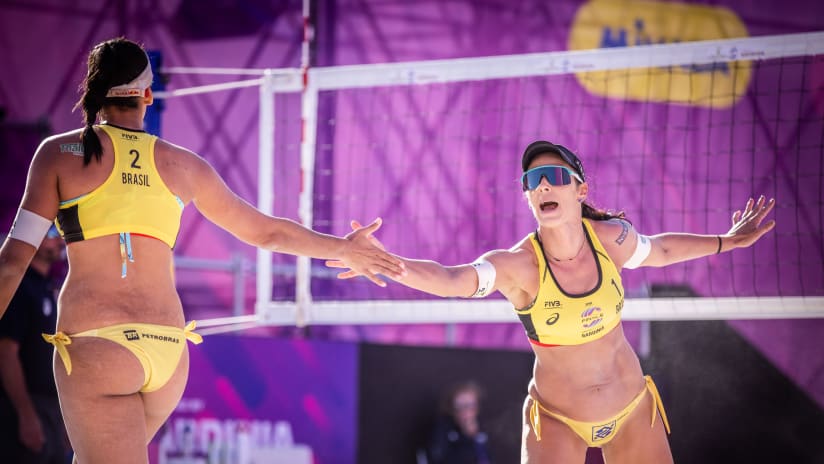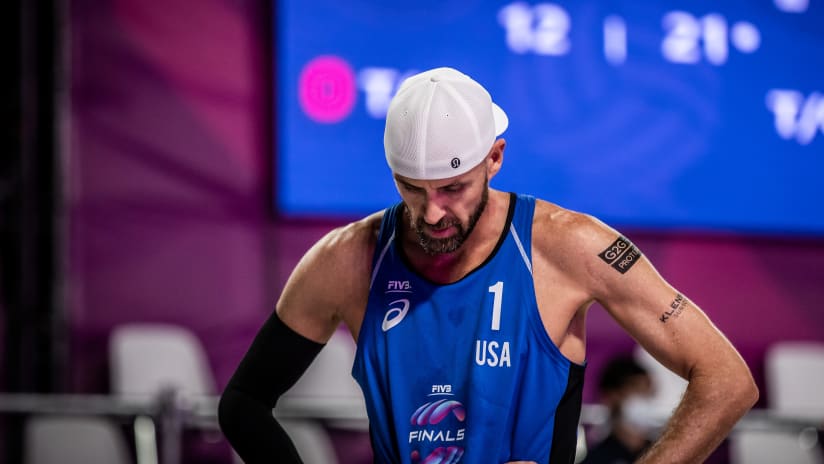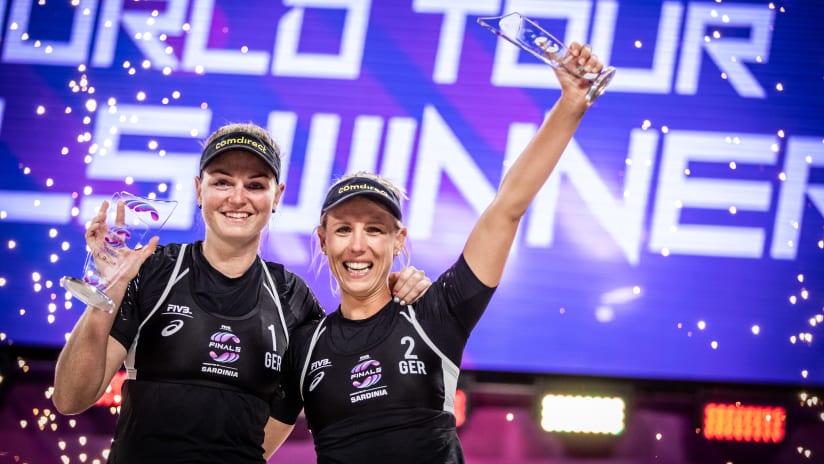After the selfies were taken and hugs – so many hugs – administered, Julia Sude stared and stared and turned over the trophy in her hands, the clear crystal on which was engraved one of the grandest titles in beach volleyball: World Tour Finals champions. It was a reaction that was raw, pure, real, the personification of disbelief.
World Tour Finals, What We Learned: When a German team qualify, they're coming for gold!
German teams have now won four World Tour Finals; it's coffee time for April Ross; Agatha-Duda have one more shot at a medal
Published 01:01, 13 Oct 2021
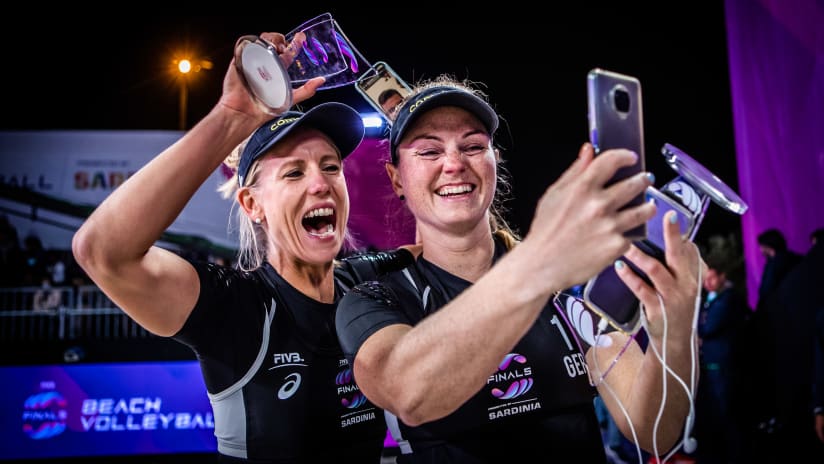
“It’s unbelievable to stand here with the trophy now, to win this tournament,” her partner, Karla Borger, would say a few moments later. “We never expected this.”
And how could they?
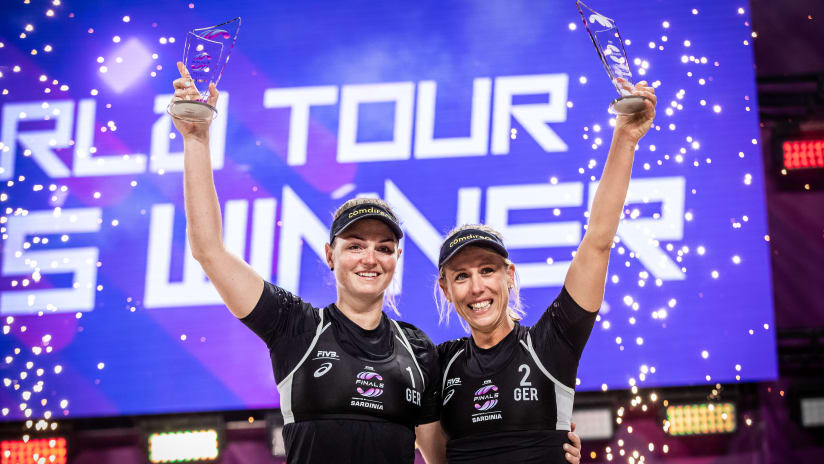
It had been, as Sude would admit, “a very tough season” for the Germans. They had gone nine straight FIVB tournaments without a medal, dating back to a gold at the Qinzhou three-star in October of 2019. At the Tokyo Olympic Games, they didn’t even win a match.
Yet here they were, the eighth seed in these World Tour Finals, gold medallists amongst the thickest field of any tournament this season. Here they were, defeating second-seeded Brazilians Agatha and Duda in the quarterfinals, vanquishing Russians Svetlana Kholomina and Nadezda Makroguzova – a team who had the Germans’ number all season long – in the semis, prevailing over the defending world champions, Melissa Humana-Paredes and Sarah Pavan in the finals.
Here they were, World Tour Finals champions.
How did that happen?
“We tried not to think so much,” Borger, the 32-year-old two-time Olympian, said. “We tried to be on the court for the next point. I totally forgot that we were playing here. It was just about us playing the next point, next point, next point.”
Perhaps that mindset, one in which the World Tour Finals stage is no different than that of, say, Cancun, is shared by not just Borger and Sude, but the German federation as a whole. In the past half-decade, German teams have had an uncanny knack for showing up on the biggest of stages in the biggest of ways.
At the 2016 Olympics, it wasn’t Kerri Walsh Jennings, she of three Olympic golds, who finished atop the podium, nor was it the Brazilian home favourites, Agatha and Barbara. It was the fourth-seeded German team of Laura Ludwig and Kira Walkenhorst, who flew through the elimination bracket without so much as a dropped set. In 2017, it would be Ludwig and Walkenhorst again who prevailed on the biggest stage of the season, claiming gold at the Hamburg World Tour Finals (after also winning the World Tour Finals in Toronto in 2016).
Two years later, in Rome? Who would it be but Germany once more, as Ludwig and Maggie Kozuch upset one team after another, the 20-seed who felled a cavalcade of giants en route to winning gold again.
With Borger and Sude putting on a similar end-of-season magic act, Germany’s grip on the World Tour Finals extends back as far as five years, with Brazilians Agatha and Duda the only non-German team to win since 2017.
The best eight or ten teams in the world played here. And to end the season with a win, it’s a huge honour to play here, even just to qualify. Julia Sude
“The best eight or ten teams in the world played here,” Sude said. “And to end the season with a win, it’s a huge honour to play here, even just to qualify.”
And when a German team does qualify, the world is now formally on notice: they’re coming for gold.
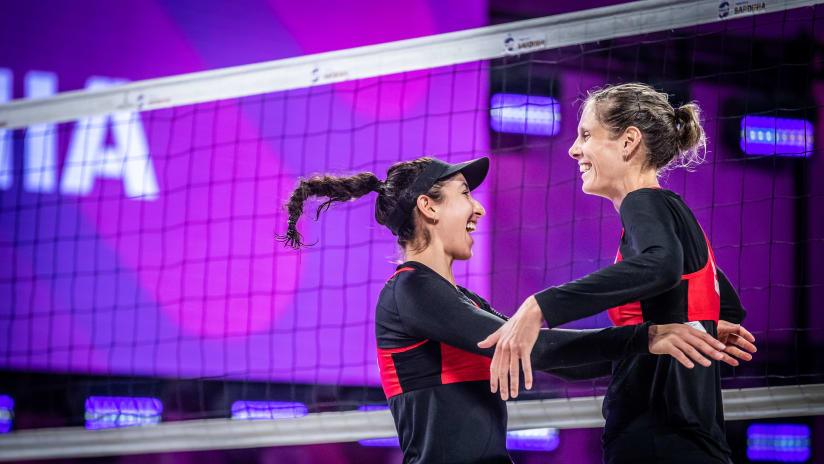
Ross-Klineman, Pavan-Humana-Paredes finish Tokyo quad with 22 combined medals
It was only fitting that the two best teams of this Olympic quad, Melissa Humana-Paredes and Sarah Pavan, and April Ross and Alix Klineman, would finish the season on the podium. Theirs has been, without question, the best rivalry in the sport, either on the men’s or women’s side. Sixteen times have they played one another on the AVP and FIVB tours. Sixteen times has the match been appointment viewing.
Their last came in the semifinals, a stunningly easy 21-15, 21-12 win for the Canadians, one of the most lopsided scores of their rivalry. But then Ross and Klineman rebounded, beating Russians Nadezda Makroguzova and Svetlana Kholomina, 21-8, 21-17, to secure their fifth medal of the season and eleventh of their partnership. While Pavan and Humana-Paredes fell to Germany in the finals, their silver marked their eleventh medal of this Olympic quad.
Twenty-two medals between the two teams in just three years is an astonishing number. At the moment, neither partnership has commented on their intentions for Paris. Ross and Klineman have committed to continue playing together for now, but three years is a long way off.
“We don’t know necessarily what the future is going to hold,” Ross said. “We’re waiting to make that decision but we want to continue playing together. Our immediate plan is to continue playing together, and if Paris is in the cards, we will let everybody know when we decide that.”
For now, with one final medal secured and no tournaments on the horizon, “it’s officially off-season,” Ross wrote on Instagram. “I’m so excited to drink lots of coffee, eat lots of croissants, do a lot of yoga, and try not to play very much volleyball.”
Ross has plenty of company in that mindset to not play much volleyball: just one of the 10 teams who competed in the World Tour Finals will be playing in the final event of the season, the Itapema four-star.
Agatha and Duda.
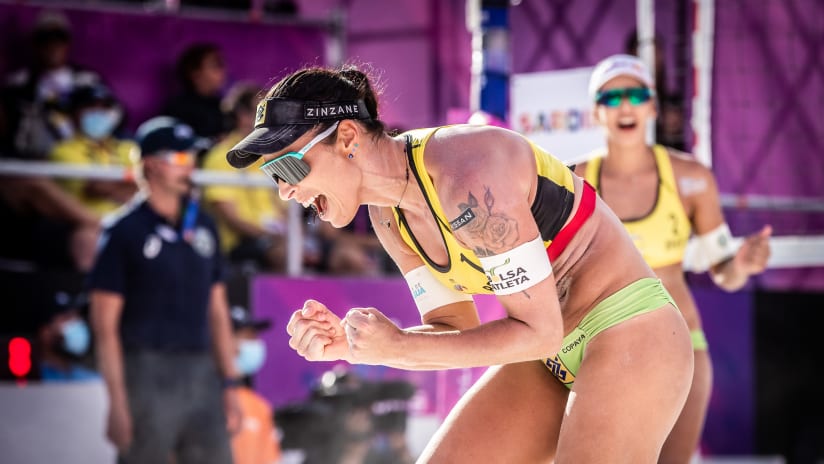
Agatha-Duda seek to finish season with one final medal
It is so rare to have Brazil off the podium in all of the biggest events of a season that it almost doesn’t exist in the history of this sport. Yet Brazilians Agatha and Duda, despite putting together arguably the most impressive, decorated Olympic quads of any team, were shut out, as were their compatriots Rebecca Cavalcanti and Ana Patricia Silva.
In Tokyo, where Agatha and Duda were the third seed after winning gold in Gstaad two weeks prior, they finished ninth, tying their lowest finish in a tournament since 2017. It speaks to their level of talent that a bad finish for the Brazilians is still in the top-10, but success in sports featuring podiums is measured off how often you stand on it. At the Olympics, they were left off it, as were Rebecca and Ana Patricia, who took fifth.
Again in the World Tour Finals, Agatha and Duda, the only Brazilian team in the field, missed on a medal, losing in an excellent match to eventual champs Karla Borger and Julia Sude, 16-21, 26-24, 11-15.
It still stands to reason that Agatha and Duda have an argument as the best team in the world, even if they are splitting after this season. They medalled in nearly half of their events in this Olympic quad, pulling home 14 medals in 32 tournaments, with another four appearances in bronze medal matches.
In Itapema in a month, they’ll be heavy favourites to finish this quad in a style befitting these last three years: on the podium, with medals around their necks.

